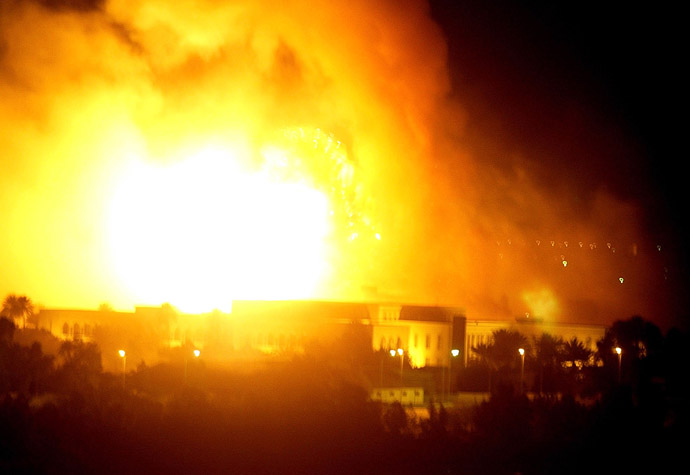George W Bush said the military operation in Iraq would “free its people.” RT’s Lucy Kafanov spoke to Iraqis from all walks of life, discovering that they believe they paid too high a price for toppling of tyranny by foreign military forces.
Haji Muhammed, a café owner in Baghdad, wishes Iraq was never
invaded by foreign forces. The years of US-occupation saw his four
sons and only grandchild killed in a suicide blast.
"I raised my sons and saw them get married and sent them to
universities. I watched them die,” he says. “You asked me if it's
better or worse now compared to 10 years ago. I still had my sons
10 years ago. So I think the answer is obvious."
The grieving father is echoed by Hadi Jallu, a political analyst in
Baghdad, who says the oppressive regime was taken down “at a very
dear price for the Iraqi people. The American invasion caused
massive losses and took too many lives. This unleashed political,
religious and ethnically-motivated violence.”
At least 134,000 Iraqi civilians are estimated to have died in the
conflict, according to the Costs of War Project by the Watson Institute for
International Studies at Brown University, published on Sunday. And
the overall number of casualties could be four times higher,
researchers say.
While Iraqis are still grieving over those who died during the
decade-long war, ongoing violence in the region means the
death-toll keeps rising.

The most recent series of explosions on Tuesday left more than 50 people killed and another 200 wounded.
"How long will Iraq remain like this? Every day there are explosions, every day there is killing, every day there is terrorism ," Samir Ismail, a shop owner from Kirkuk, cries.
New figures show that death rates have actually gone up since the last American soldier left Iraqi soil.
Growing sectarian strife is cited as main reason for these attacks. Tension is on the up between Sunni provinces and the Shia-led government as well as between Baghdad and the Kurdish north.
"I think if these issues are not resolved, it can lead to more significant problems including armed conflict, which can lead to, I think, [the] breakup of Iraq and destabilization of the region ," Najm al-Din Karim, governor of Kirkuk province, believes.
One of the goals stated by Western forces invading Iraq was saving its people from tyranny. Now elections may have brought democracy to Iraq, but the population complains the government is rife with corruption and infighting. There’s a feeling shared by many Iraqis RT spoke to that during the years of occupation the political structure only grew highly tribal with forces struggling for power capable of armed conflict.
"Despite the failures that occurred in the time of the former regime, it is not comparable to the number of failures by the politicians and the current government ,” Um Mustaf, a school teacher at Tikrit Secondary School for Girls told RT.
Her dissatisfaction with politicians is only natural, when you find out education system is one of the things worst damaged by the war in Iraq. Health and infrastructure are also on that list, according to the Costs of War Project, which goes on to say “
the $212 billion reconstruction effort was largely a failure with most of that money spent on security or lost to waste and fraud .”
Some in the younger generation of Iraqis who survived the years of violence see the decade of the US occupation as a requiem for their dream.
"I was top of my class but when things became very bad after the occupation, I felt that something was broken inside of me, my ambition and everything. I used to dream of becoming a doctor or an engineer, but conditions prevented me from continuing my studies ,” Wissam Jamal Jabbar, a Baghdad resident told RT.
And education is no guarantee of work. Less than 40 per cent of Iraqi adults have a job and a quarter of families live below the World Bank’s poverty line. Statistics that haven’t improved much since the days of crushing UN sanctions imposed on Iraq in 1990, following its invasion of Kuwait. They meant almost a total financial and trade embargo and were a severe blow to Iraq’s economy.
